
BRITISH JOURNAL OF CANCER
Scope & Guideline
Elevating the Standards of Cancer Research.
Introduction
Aims and Scopes
- Cancer Mechanisms and Biology:
Research focusing on the molecular and cellular mechanisms driving cancer progression, including studies on genetic alterations, epigenetics, and the tumor microenvironment. - Clinical Oncology:
Investigations into the effectiveness of various cancer treatments, including chemotherapy, immunotherapy, and targeted therapies, often involving clinical trials and treatment outcomes. - Epidemiology and Prevention:
Studies exploring risk factors associated with cancer development, including lifestyle, genetic predispositions, and environmental influences, aimed at improving early detection and prevention strategies. - Biomarkers and Diagnostics:
Research dedicated to the identification and validation of biomarkers for cancer diagnosis, prognosis, and therapeutic response, including the development of liquid biopsy techniques. - Translational Research:
Studies that bridge laboratory research and clinical applications, focusing on translating findings from basic science into effective cancer therapies. - Health Services Research:
Investigations into cancer care delivery, health policy, and patient outcomes, addressing disparities in access to treatment and care.
Trending and Emerging
- Immunotherapy and Immune Checkpoint Inhibition:
A significant increase in research related to immunotherapy, particularly studies examining immune checkpoint inhibitors and their role in enhancing anti-tumor responses. - Liquid Biopsy and Minimal Residual Disease:
Growing interest in liquid biopsy technologies for early detection, monitoring treatment response, and identifying minimal residual disease, which signifies a shift towards non-invasive diagnostic methods. - Personalized and Precision Medicine:
An upward trend in research aimed at tailoring cancer treatment based on individual genetic profiles and tumor characteristics, reflecting advancements in genomic medicine. - Cancer Metabolism:
An emerging focus on the metabolic pathways involved in cancer progression, with studies exploring how metabolic reprogramming can influence treatment responses. - Cancer Health Disparities and Equity Research:
Increasing attention on health disparities, with research aimed at understanding and addressing the inequities faced by different populations in cancer diagnosis and treatment.
Declining or Waning
- Traditional Chemotherapy Studies:
There is a noticeable reduction in papers solely focused on conventional chemotherapy regimens, as the field increasingly explores personalized medicine and targeted therapies. - Basic Science without Clinical Relevance:
Research that does not directly connect basic scientific findings to clinical applications appears to be less prevalent, reflecting a trend towards studies with immediate relevance to patient care. - Single-Agent Studies:
The journal has published fewer studies on single-agent therapies, as combination therapies and multi-target approaches are becoming more prominent in cancer treatment research. - Aging and Cancer Research:
Research specifically addressing the aging population and its relationship with cancer has decreased, possibly overshadowed by more pressing topics such as cancer immunotherapy. - Palliative Care Studies:
The number of publications focused on palliative care strategies has diminished, as the journal increasingly emphasizes curative and impactful treatment modalities.
Similar Journals

CANCER
Driving innovation in cancer treatment and biology.CANCER, published by Wiley, stands as a pivotal journal in the field of oncology and cancer research, boasting an impressive impact factor and consistently dynamic growth since its inception in 1948. With an ISSN of 0008-543X and an E-ISSN of 1097-0142, this esteemed journal is recognized for its rigorous peer-reviewed articles, making significant contributions to the understanding of cancer biology, treatment modalities, and clinical practices. CANCER holds a distinguished position in the academic community, securing its placement in the Q1 category for both cancer research and oncology, and ranks within the top percentiles on Scopus, indicating its high impact and relevance. The journal is particularly beneficial for researchers, professionals, and students seeking to stay abreast of the latest advancements in cancer science. By addressing essential research questions and providing pathways for new therapies, CANCER continues to play a crucial role in shaping the future of oncology and improving patient outcomes.
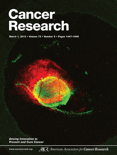
CANCER RESEARCH
Elevating the standards of cancer research and innovation.Cancer Research, published by the American Association for Cancer Research, is a premier journal in the field of oncology, renowned for its commitment to advancing cancer research since its inception in 1941. With an impressive impact factor reflecting its vital role in the field, this journal consistently ranks in the Q1 quartile for both Cancer Research and Oncology, positioning it among the top 7.5% of journals in these categories. The journal serves as a crucial platform for researchers, professionals, and students to disseminate and gain insights into groundbreaking studies that shape our understanding of cancer biology, prevention, diagnosis, and treatment. While it is not an open-access publication, its rigorous peer-review process ensures that only high-quality research is published, thus maintaining a standard of excellence in the scientific community. With a strong legacy and an ever-expanding influence, Cancer Research continues to be essential for anyone dedicated to the fight against cancer, showcasing cutting-edge research that drives scientific discovery and innovation.

BULLETIN DU CANCER
Innovative insights shaping the future of oncology.BULLETIN DU CANCER is a pivotal academic journal dedicated to the field of oncology, providing a platform for innovative research and insights into cancer treatment and diagnostics. Published by Elsevier Masson, Corp Off in France, this journal has been a part of the scientific community since 1966, and is committed to sharing critical findings that influence clinical practices and improve patient outcomes. Despite its recent rankings placing it in the Q4 category for Cancer Research and Q3 for Hematology and other related fields, BULLETIN DU CANCER remains essential for those interested in the latest developments in cancer biology and treatment methodologies. With an emphasis on both basic and clinical research, it serves as a valuable resource for researchers, healthcare professionals, and students seeking to deepen their understanding in various dimensions of oncology. This journal is particularly relevant as it continues to spotlight emerging research trends and supports the global imperative to combat cancer more effectively.

Translational Oncology
Advancing Cancer Research from Lab to LifeTranslational Oncology is a premier open access journal published by Elsevier Science Inc, dedicated to the rapidly evolving field of cancer research and oncology. Since its inception in 2008, the journal has been a vital platform for the dissemination of innovative research and findings that bridge the gap between laboratory discoveries and clinical applications. With an impressive impact factor and ranked Q2 in Cancer Research and Q1 in Oncology, it occupies a prominent position in the academic landscape, helping to shape the future of cancer therapeutics and patient care. The journal offers valuable insights across a diverse array of topics, including molecular biology, genetic factors in cancer, and innovative treatment strategies, ensuring relevance and engagement for its readership. As it converges toward 2024, Translational Oncology continues to attract a global audience of researchers, healthcare professionals, and students committed to advancing our understanding of cancer and enhancing clinical outcomes.
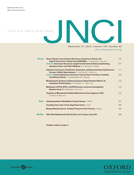
JNCI-Journal of the National Cancer Institute
Advancing cancer research for a brighter tomorrow.JNCI-Journal of the National Cancer Institute, published by Oxford University Press Inc. in the United Kingdom, is a premier journal dedicated to advancing the field of cancer research and oncology. With a distinguished history dating back to 1940, this journal has consistently maintained a strong reputation within the academic community, achieving a remarkable Q1 ranking in both Cancer Research and Oncology as of 2023. Researchers and practitioners rely on the JNCI for original research articles, review papers, and cutting-edge findings that impact clinical practices and therapeutic strategies. Although it does not currently offer open access, the journal remains a vital resource for academicians and healthcare professionals seeking to enhance their understanding of cancer mechanisms and treatment innovations. Its rigorous peer-review process ensures the publication of high-quality, credible research that meets the evolving challenges of cancer treatment and prevention through to 2024.

Journal of the Egyptian National Cancer Institute
Advancing cancer research, one article at a time.Journal of the Egyptian National Cancer Institute, published by SPRINGER, serves as a vital platform for disseminating innovative research in the field of oncology and cancer research. With both ISSN 1110-0362 and E-ISSN 2589-0409, this Open Access journal has been committed to making significant contributions to the scientific community since its inception in 2005. Operating from its base in Egypt, it has established itself as an important resource for researchers, practitioners, and students alike, offering insights into contemporary issues and advancements in cancer care. Recognized in the 2023 category quartiles as Q3 in Cancer Research and Q3 in Oncology, the journal is positioned to impact the ongoing discourse in cancer treatment strategies and health policy. As it continues to publish peer-reviewed articles through available Open Access avenues, the Journal of the Egyptian National Cancer Institute remains dedicated to enhancing the knowledge base and collaborative efforts within the global cancer research community.
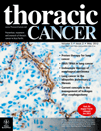
Thoracic Cancer
Shaping the landscape of thoracic cancer research.Thoracic Cancer is a distinguished open-access journal published by WILEY, dedicated to advancing the field of thoracic oncology. Since its establishment in 2010, the journal has emerged as a crucial platform for the dissemination of innovative research and clinical studies relating to lung cancer and other thoracic malignancies. With a commendable impact reflected in its 2023 Q2 rankings in the categories of Medicine (Miscellaneous), Oncology, and Pulmonary and Respiratory Medicine, the journal features high-quality articles that are vital for researchers, clinicians, and students aspiring to enhance their understanding of thoracic cancers. Operating out of Australia, Thoracic Cancer has embraced a commitment to open access since 2015, ensuring that vital research is readily available to a global audience. The journal's rigorous peer-review process and emphasis on novel findings make it an indispensable resource for professionals seeking to stay at the forefront of this rapidly evolving field.
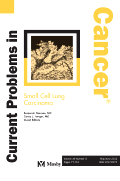
CURRENT PROBLEMS IN CANCER
Advancing Oncology: Addressing Today’s Challenges in Cancer ResearchCURRENT PROBLEMS IN CANCER is an esteemed journal published by MOSBY-ELSEVIER, dedicated to advancing the field of oncology and cancer research. With an ISSN of 0147-0272 and an E-ISSN of 1535-6345, it has been a vital resource for over four decades, converging years of expertise from 1976 to 2024. The journal is recognized for its impactful contribution to the field, currently holding a Q3 ranking in Cancer Research and a Q2 ranking in Oncology, reflecting its importance in disseminating significant advancements and discussions in the field. It is ranked #164 out of 404 in Medicine _ Oncology and #131 out of 230 in Biochemistry, Genetics and Molecular Biology _ Cancer Research on Scopus, indicating its relevance and reach among academic circles. Although it does not offer open access, the journal remains a crucial platform for researchers and professionals seeking to explore contemporary issues in cancer treatment and management. With its commitment to quality and innovation, CURRENT PROBLEMS IN CANCER serves as an essential conduit for knowledge sharing and research development in oncology and cancer science.

Cancers
Empowering discovery in oncology and cancer treatment.Cancers is a leading peer-reviewed journal published by MDPI, dedicated to advancing the field of oncology and cancer research. Established in 2009 and based in Switzerland, this Open Access journal provides a platform for the rapid dissemination of high-quality research findings, reviews, and clinical studies related to all aspects of cancer biology and treatment. With an impressive impact factor and recognized as Q1 in Oncology and Q2 in Cancer Research for 2023, Cancers strives to foster a collaborative environment among researchers, healthcare professionals, and students seeking to deepen their knowledge and understanding of cancer. The journal’s commitment to accessibility and its broad scope make it an invaluable resource for anyone passionate about combating cancer and improving patient outcomes. For more information and to access its diverse publications, visit the journal’s website.
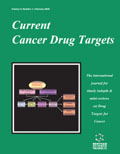
CURRENT CANCER DRUG TARGETS
Connecting knowledge and innovation in cancer drug development.CURRENT CANCER DRUG TARGETS is a prominent academic journal published by Bentham Science Publishers Ltd, focusing on the critical intersection of cancer research and innovative drug development. Since its inception in 2001, this journal has offered a platform for the dissemination of cutting-edge research aimed at advancing targeted cancer therapies, contributing significantly to the fields of Cancer Research, Drug Discovery, Oncology, and Pharmacology. With a respectable impact factor and consistent ranking in its respective categories, including Q2 in Drug Discovery and Pharmacology, it positions itself as an invaluable resource for researchers, clinicians, and students alike. CURRENT CANCER DRUG TARGETS is dedicated to enhancing our understanding of novel therapeutic targets and methods, thereby fostering a collaborative environment for knowledge exchange in the ever-evolving landscape of cancer treatment.